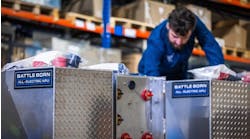The overall impact of the General Motors Corp. (GM) plant closing announcement made today will be marginal on trucking, analysts told FleetOwner. GM said it will close nine assembly, stamping and powertrain facilities and three service and parts operations in the U.S. and Canada over the next three years, which will cut 30,000 jobs.
“It’s significant to local economies and significant to carriers that work with GM in supplying parts into the facilities,” said Chris Brady, president of Commercial Motor Vehicle Consulting told Fleet Owner. “It’s also significant to carriers that transport the parts to those facilities or transfer finished parts from the factories to assembly plants.”
However, from the perspective of the overall trucking industry, the impact of the closures will be “marginal,” stated Brady. “From the perspective that capacity is tight, it could be time to pick up additional customers if you lose business,” he said. “It’s never good to lose a customer, but there are tons of potential customers looking for carriers to move freight.”
And with the #1 automaker renewing efforts to squeeze out costs and scale back manufacturing, carriers are finding that hauling for The Big Three (GM, Ford, Chrysler) is an increasingly volatile proposition.
“USF has a significant presence in the auto industry,” Satish Jindel, president of S.J. Consulting told Fleet Owner, adding that auto-related freight may transfer from GM to its Japanese rival, Toyota Motor Corp. “For example, for carriers like USF Holland, it may change the length of haul that takes place. Japanese automakers tend to have production more in the South.
“USF Holland is relying on the auto industry quite a bit and has been working on reducing their reliance in the sector,” Jindel continued. “[GM’s actions] will result in some shift in how [carriers] rely on automotive freight. I think more carriers will look at the retail industry for customers.”
For example, Contract Freighters Inc. (CFI), which drew 40% of their business from the Big Three in the early ‘90s, has since dropped that to less than 1%, according to Herb Schmidt, president & CEO, in an earlier interview.
See GM belt-tightening will impact carriers.
Specifically, six assembly plant sites will see cutbacks:
- Oklahoma City, OK, will cease production in early 2006.
- Lansing, MI, Craft Centre will cease production in mid-2006.
- Spring Hill, TN, Plant/Line No. 1, will cease production at the end of 2006.
- Doraville, GA, will cease production at the end of its current products’ lifecycle in 2008.
- The third shift will be removed at Oshawa Car Plant No. 1 in Ontario, Canada, in the second half of 2006. Subsequently, Oshawa Car Plant No. 2 will cease production after the current product runs out in 2008.
- The third shift will be removed at Moraine, OH, during 2006 with timing to be based on market demand.
Actions affecting stamping, service & parts operations and powertrain facilities include:
- The Lansing, MI, Metal Center will cease production in 2006
- The Pittsburgh, PA, Metal Center will cease production in 2007
- The Parts Distribution Center in Portland, OR, will cease operations in 2006; the Oarts Distribution Center in St. Louis, MO, will cease warehousing activities and will be converted to a collision center facility in 2006; the Parts Processing Center in Ypsilanti, MI, will cease operations in 2007. One additional Parts Processing Center, to be announced at a later date, will also cease operations in 2007.
- St. Catharines Ontario Street West powertrain components facility in Ontario, Canada will cease operations in 2008.
- The Flint, MI, North 3800 engine facility will cease production in 2008.



